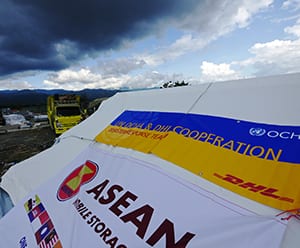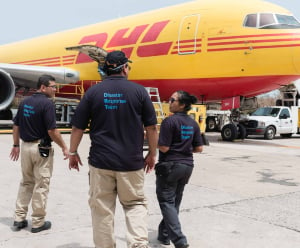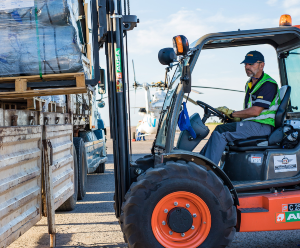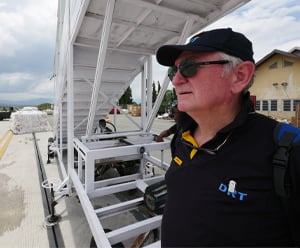
He pioneered DHL’s disaster response program 20 years ago. Here’s his story

It was January 2001.
Chris Weeks was on the lookout for a change in his career — not just something different, but something that had greater meaning and purpose.
That same month, a 7.9 magnitude earthquake struck Gujarat, India, killing more than 20,000 people and destroying 400,000 homes.
At the time of the tragedy, Weeks’ CEO was attending the World Economic Forum meeting in Davos, Switzerland. The attendees present, many of them Indian, were all eagerly trying to pitch in and help in the aftermath of the disaster but to no avail.
The problem? A lack of connection at the time between the business world and the humanitarian community, which is instrumental to the coordination of aid relief efforts.
There needed to be someone spearheading and coordinating the efforts of the logistics community, which can then come together to help the humanitarian professionals in the event of another disaster.
For Weeks, now Director for Humanitarian Affairs at Deutsche Post DHL Group (DPDHL), it was a case of being in the right place at the right time that he was given the opportunity by his CEO to take up the mantle.
Since then, the Group’s GoHelp disaster management program — comprising the Get Airports Ready for Disaster (GARD) program and the Disaster Response Team (DRT) — has grown from strength to strength.
The journey
“It’s not been a straight road, it has had its difficulties,” said Weeks on the challenges he has faced.
The humanitarian community was initially skeptical about the Group’s motives of helping out at disaster-hit airports until they saw value in the logistics expertise provided by the Group’s volunteers, who all hold day jobs in the company.
Led by Weeks, the GoHelp program set up teams of volunteers in Dubai, Singapore, and Panama, which were chosen for their proximity and accessibility to disaster-prone countries in the respective regions.
He fine-tuned the program through discussions with UN agencies and NGOs, and a lot of trial and error. “When we started out trying to figure out the best way to assist the humanitarian community, we looked at the entire supply chain,” shared Weeks.
“We were thinking of using our logistics expertise to help with strategic stockpiling, warehousing, shipping, trucking,” he added. Things quickly changed when his colleague witnessed firsthand the chaos that consumed a small provincial airport following the devastating 2003 earthquake that hit the city of Bam in Iran.
“That gave us the idea of setting up a skilled volunteer team to help humanitarians with airport logistics. The military can help with the transport and the trucking, but it's the airfield logistics that nobody seems to grasp,” explained Weeks.
The idea was simple — a few skilled DHL volunteers would fly in to support the airport ground handlers during the critical period of seven to 10 days after a disaster when there is a surge in inbound cargo flights.
They would help offload the aircraft and arrange temporary warehousing for the relief supplies so they can be reloaded onto trucks when they were needed by the NGOs. Once operations stabilized, they would return to their daily jobs from the deployment.
Over the years, the evolution of containerization in modern jets has changed the way teams are composed and the way goods are offloaded in disaster areas, which used to be a labor-intensive task.
Added Weeks: “We need fewer people to do the actual offloads, but we need people who can operate the specialist equipment. Other volunteers are still needed to do organizational and liaison roles. The volunteers must be flexible and resilient individuals who can work with the humanitarians on the ground.”
Partnering for success
Today, the GoHelp program has transformed into a well-oiled machine with two core functions: disaster preparedness and response.
The GARD program, which has assessed more than 50 airports, prepares airports for the potential logistical challenges in the aftermath of natural disasters.
For disaster response deployments, the DRT volunteers from DPDHL will work closely with humanitarian workers unloading air freight pallets, warehousing relief supplies, conducting inventory, and ensuring incoming supplies get distributed to the aid organizations quickly and efficiently.
Weeks is under no illusion that the success achieved by the GoHelp program so far is the Group’s effort alone. The continued support from non-governmental organizations (NGOs) and United Nations’ (UN) agencies, such as the UN Office for the Coordination of Humanitarian Affairs (OCHA) and World Food Program (WFP), has been invaluable during deployments and training sessions.
“I wouldn't dare do [the GoHelp program] without partnering with a major UN agency. After all, we're not humanitarians, we're a logistics company,” he added candidly.
“It's really important that we don't try to do the whole nine yards. We just do the bit that we're good at, and let the humanitarian experts handle the end deliveries.”
For instance, before the two-week DRT deployment in Nassau, Bahamas last year, the airport and its staff were ill-equipped to handle the influx of cargo flights in the aftermath of Hurricane Dorian. Being mainly a tourist airport, they were ill-equipped and were not prepared for all-cargo flights.
“Our team from Panama went over and, within a day, they were operating airside and pulling containers off aircraft coming in from the U.S.
“It's about bringing skills and equipment to the airport so that we can offload the aircraft and reload onto trucks to deliver to the people who need it,” explained Weeks about the important role of the DRT.
Since the launch of the DRT, the team has completed over 40 deployments in different regions around the world.
In South America, other than partnering with the UN, the team has also recently forged a close partnership with the Red Cross Society. “Working with them allows us to do more national responses, typically flooding, where there are donations from the public that need handling and distribution,” shared Weeks.
Regardless of the deployment, the airport will always be the focal point for all aid and people coming in, and will continue to be the main bottleneck.
Having witnessed firsthand the chaos at every deployment, Weeks is sure that the need for airport logistics will not go away anytime soon.
“It gives me great satisfaction to be able to apply professional skills from a private company to a humanitarian environment. We will continue to concentrate our efforts on logistics — it's what we do best.”
MORE FROM THIS COLLECTION

















 English
English